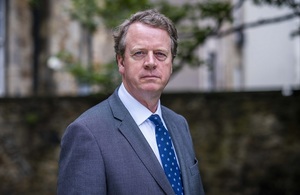Historic Oxfordshire railway bridge to be restored to its former glory
A deteriorating nineteenth century railway bridge in Oxfordshire will be given a new lease of life as part of a renovation project led by National Highways.
Restoration of the railway bridge in Horspath was announced in May, and, following a number of preparatory surveys, work is now set to start on 11 October.
The bridge was built in the mid-nineteenth century – during the reign of Queen Victoria – as part of the Princess Risborough to Oxford line and was in use until the 1960s when a decline in passengers led to the line being decommissioned.
The renovation is set to take ten weeks to complete, with work finishing on 17 December, and will ensure the bridge’s continued use for local residents for many years to come, while preserving an important piece of British heritage.
Work on the bridge includes:
- Replacement of all missing and fractured brickwork on the arches with all open joints re-pointed. The full arch will also be cross-stitched and grouted.
- Repair of all masonry fractures to the north east, north west and south east abutments.
- The parapets which were removed earlier this year due to safety concerns will be fully re-built using the re-claimed bricks, with new sympathetically matched bricks making up the shortfall.
- Fractures to the north and south spandrels will be repaired and re-grouted.
- All four wing walls will be fully renovated, repairing all fractures, re-laying displaced copings and re-pointing all brickwork.
Speaking on the upcoming work Fiona Smith, Highways England Historical Railways Estate civil engineer said:
We are delighted that this work has now been confirmed and we can set about restoring the bridge for the residents of Horspath to enjoy in the future. We have been working closely with the local community on planning this work and are looking forward to returning this bridge to its former glory.
It has always been our wish to fully renovate this bridge and we have been working closely with Horspath Parish Council, Oxfordshire County Council and the local community to ensure this positive outcome.
The project to restore the bridge attracted huge interest from the residents of Horspath earlier this year when ongoing deterioration led National Highways to remove the brick parapets due to safety concerns. A team of local residents, under the supervision of fellow resident Spencer Timmo, volunteered to clean up and repair over 3,000 old bricks which were removed from the bridge. This was a huge undertaking, and the result of their efforts has meant that up to half over the bricks needed for the work will be the original bricks, ensuring a sympathetic renovation can be undertaken.
During the work to renovate the bridge, Cuddesdon road under the bridge will be closed and traffic will be diverted from Cuddesdon Road onto Wheatley Road, Oxford Road and the Eastern By-pass.
National Highways maintains more than 3,000 structures for the Department for Transport across the length of Great Britain. All structures are former operational structures and consists of surplus railway property, mainly resulting from the closure of railway lines in the 1960s.
General enquiries
Members of the public should contact the National Highways customer contact centre on 0300 123 5000.
Media enquiries
Journalists should contact the National Highways press office on 0844 693 1448 and use the menu to speak to the most appropriate press officer.

